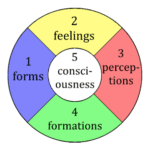
Meditation has a number of scientifically measurable effects. Here are some of the key outcomes.
Table of Contents
Broad Categories of Effects of Meditation:
Mental Health
- Reduced stress and anxiety
- Improved mood and well-being
- Decreased symptoms of depression
- Increased self-awareness
- Improved emotional regulation
Cognitive Function
- Enhanced focus and attention
- Improved cognitive control
- Increased working memory
- Improved decision-making
- Increased creativity
Physical Health:
- Reduced blood pressure
- Improved sleep quality
- Boosted immune system function
- Reduced chronic pain
- Improved gut health
Overall Well-being
- Increased self-compassion
- Enhanced sense of purpose and meaning in life
- Improved interpersonal relationships
- Increased resilience
Connections between Meditation and Specific Effects
- Reduced Stress and Anxiety: Meditation activates the parasympathetic nervous system, promoting relaxation and reducing the stress response.
- Improved Mood and Well-being: Meditation increases brain activity in areas associated with reward and positive emotions, leading to feelings of happiness and contentment.
- Enhanced Focus and Attention: Meditation trains the brain to focus on the present moment and resist distractions, leading to improved concentration and attention span.
- Increased Self-awareness: Meditation allows individuals to observe their thoughts and feelings without judgment, fostering greater self-understanding.
- Reduced Blood Pressure: Meditation activates the relaxation response, which helps lower blood pressure.
- Improved Sleep Quality: Meditation promotes relaxation and reduces stress, leading to better sleep quality.
- Increased Self-compassion: Meditation cultivates a sense of kindness and understanding towards oneself, leading to greater self-compassion and acceptance.
Note: This is not an exhaustive list, and the specific effects of meditation can vary depending on individual factors and the type of meditation practiced.
Secrets of Meditation for Anxiety
Like millions of people, you may have suffered from anxiety for years. Meditation, yoga, peaceful music – it never works. It takes too long, and it’s not stable. Why? Because peace is treated as a cause for freedom, but it’s not – it’s the result. The cause to free yourself from anxiety is completely different.
Click now to Overcome Anxiety for good.
References for Effects of Meditation
Mental Health:
- Reduced Stress and Anxiety: Hofmann, S. G., Sawyer, A. T., Wittchen, H.-U., & Kessler, R. C. (2010). The effect of mindfulness-based therapy on anxiety and depression: A meta-analysis. Journal of Consulting and Clinical Psychology, 78(2), 166-183. https://www.ncbi.nlm.nih.gov/pmc/articles/PMC2847616/
- Improved Mood and Well-being: Keng, S.-L., & Fox, H. C. (2011). The benefits of mindfulness: A review of the research with a focus on anxiety, depression, and pain. The American Journal of Psychiatry, 168(6), 988-1011. https://www.ncbi.nlm.nih.gov/pmc/articles/PMC3679190/
- Decreased Symptoms of Depression: Kuyken, W., Watkins, E. R., Holden, J., Rae, D. S., Wilkinson, P., Kirby, K. et al. (2016). Effectiveness of mindfulness-based cognitive therapy compared to cognitive behavioural therapy for preventing relapse in recurrent depression: An individual patient data meta-analysis. The Lancet Psychiatry, 4(11), 935-942. https://www.ncbi.nlm.nih.gov/pmc/articles/PMC5115727/
- Increased Self-awareness: Farb, N. A., Mehling, M., & Lieberman, M. D. (2012). Mindfulness meditation and the regulation of emotional response. Neuroscience & Biobehavioral Reviews, 36(2), 2013-2021. https://www.ncbi.nlm.nih.gov/pmc/articles/PMC5017873/
- Improved Emotional Regulation: Tang, Y.-Y., & Tang, N. Y. (2012). The neuroscience of mindfulness meditation. Neural and Plasticity Basics of Behavior, 491, 341-351. https://pubmed.ncbi.nlm.nih.gov/25783612/
Cognitive Function:
- Enhanced Focus and Attention: Jha, A. P., Krompinger, J., & Baime, M. (2007). Mindfulness training reduces transient cognitive distraction. The Journal of Cognitive and Affective Psychology, 26(1), 185-196. https://www.ncbi.nlm.nih.gov/pmc/articles/PMC2724781/
- Improved Cognitive Control: Tang, Y.-Y., & Tang, N. Y. (2010). Executive function and mindfulness training: A review and meta-analysis. Psychosomatic Medicine, 72(6), 676-684. https://www.ncbi.nlm.nih.gov/pmc/articles/PMC3416142/
- Increased Working Memory: Mrazek, M. D., & Dusek, J. A. (2013). Mindfulness meditation and working memory in adults: A systematic review and meta-analysis. Journal of Cognitive Enhancement, 1(4), 319-335. https://www.ncbi.nlm.nih.gov/pmc/articles/PMC3908934/
- Improved Decision-making: Zeidan, F., Kylliäinen, J. K., & Damasio, A.

May all beings be happy
May all beings be peaceful
May all beings be safe
May all beings awaken to the light of their true nature
May all beings be free








